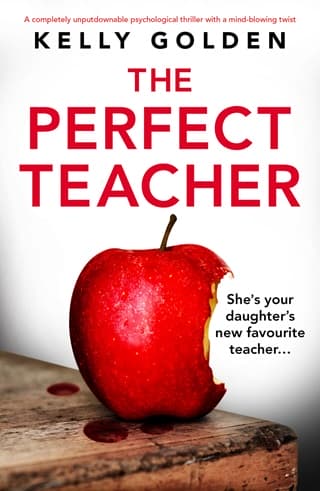69. After
Today I'm teaching a class on interview technique. It takes some effort not to advise them all to dress according to the sexual persuasion of the interviewer, but there's a supervisor sitting at the back with a hangover so pungent we might as well be in a brewery.
We all envy him. What did he get up to last night? Those marks on his cheek – in what delicious violence did he partake?
But then he yawns and leans his head back on the wall, his mouth falling open, and I realise I can teach this any way I like.
I write on the whiteboard: Stalking, Intent, Premeditation, Deceit. Then I look out at my fellow tooth-picking, ball-scratching prisoners and say, ‘Forget being yourself. Forget showing them your potential. Every interview is a straight-up con job, and you need to treat it like a professional.'
By the end of the class, everyone's laughing. Everyone thinks they know how to trick someone into giving them the job. And I feel dirty. This is only funny because not a single one of them believes they could ever get a good job on merit.
But who cares? If I can help them get a job one way or another, then maybe one day they'll realise they deserve it.
Maybe, instead of waiting all their goddamn lives on an NHS list for six sessions of cut-and-paste CBT that teach them how to bottle it all in, they'll have an epiphany and re-evaluate all of their relationships, their whole lives, and realise that they have not been treated well, that the hand they were dealt came from a stacked deck, and maybe, just maybe, they should do something about it.
I'm glad I sent Deandra back into the world with the tools to execute her revenge properly. Revenge is the only upstanding reason for criminality.
That's what prison is, isn't it? State-sponsored revenge.
People need to be taught. They don't learn. They don't listen. They grin and get away with it.
Forgiveness is just cowardice. We all fantasise about wrapping our fingers round the necks of our nearest and dearest. And when things are really bad, we sometimes even let ourselves believe we could do it. Just for a moment, in the bright flash of anger, it becomes real.
But what about a cold, calculated attack, carefully plotted and meticulously executed, and not on the object of your fury, but their innocent offspring?
Neil called me late that afternoon, long after all the children had left, and I knew before he spoke that something had happened to Jenna. I felt a chill down my spine, but I had just given a suicidal teen the keys to a derelict mansion, so I can't pretend it was altogether surprising.
‘Georgie, you haven't gone home, have you?'
‘No.'
‘Did Jenna Beaufort-Bradley say anything to you about where she was going after class? Who she was getting a lift home from?'
So, I thought. She's gone.
‘Jenna wasn't in my class today. Rose said she went home – she wasn't feeling well.' This was true.
‘She wasn't in your class?'
Usually, I hate that tendency people have to repeat disappointing information in the hopes that doing so might change it, but in Neil I found it endearing. I could see his big bear eyes widening, the ‘oh, shit' sinking in.
‘No, she wasn't.'
‘Well, she didn't go home either.'
‘Oh,' I say, wondering how to act. ‘Oh, dear.'
Neil sighed.
I looked down at my desk, at the two halves of the ruler Jenna had snapped.
‘I saw Jenna this morning. She was… upset. And she'd chopped off all her hair.' That was when I should have fessed up to Neil about Trevethan House. If Jenna was actually there, she'd cover for me. Jenna was smart. She'd say I told her about the house, but not about the key, and I'd never actually invited her. Or something like that.
Did I really think she was suicidal? Why had I told her about the house?
Because I wanted her to go. I wanted to get her alone. Neil thought I shouldn't get involved. But I was involved already.
And yes, I'd thought she was suicidal before she ever even spoke a word to me.
She had a problem. I could be the answer.
‘Sorry, Neil.'
‘It's probably nothing,' he said.
‘Probably.'
I knew he expected me to offer to stay at the school and help, but I didn't. I had places to be.
‘Okay, well, keep your phone on you in case this becomes serious.'
‘Will do,' I said.
‘Right.'
‘I love you.'
‘I love you too.'
We hung up, and I sat back, my pen still poised.
I love you.
I had said it without thinking. Because I meant it. And because I needed his trust.
Why do we trust the ones we love? Why do we make that mistake again and again and again?
We had never said it before.
But he said it back.
Why? Did he mean it?
This had never happened to me before. I had never let a relationship get this far. Was it normal to say it then hang up like it was nothing?
I blinked, then got back to my marking. Children's opinions on Shakespeare are hard enough to read even when they're not written in smeary, slug-trail fountain pen, but all you really have to do is read the name at the top. I finished quickly. Usually, I'd have been at my dad's, but something about that morning had kept me at PES, and that instinct had been proven right.
I started planning my next lesson with Jenna but found myself staring out the window. A group of girls were playing frisbee, watched by a group of boys. I watched them watching, till I felt enough time had passed between Neil's call and my leaving for it not to seem as though the two were linked.
 Fullepub
Fullepub 



